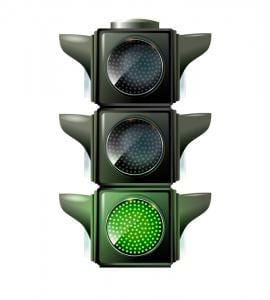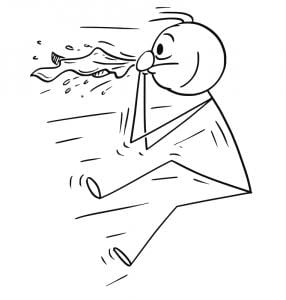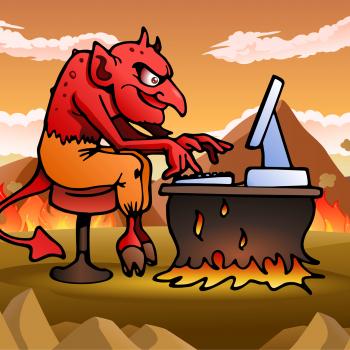Remember, Church: the stock market does matter to your survival. Embrace this perilous time as the best of all occasions to practice serious self and institutional reflection, repent from and leave behind encrusted habits and dysfunctional modes of operation, and see this as a different way to celebrate Easter.

I’ve seen a lot of dismissive comments about how silly it is to worry about the stock market while the pandemic is raging. Why? It is obviously more important to contain the virus than worry about the economy.
Well, yes, it is more important to contain the virus. Unfortunately, we’ve passed the point of being able to do that. We may be able to slow down the number of new infections temporarily. We may be able to slow the tragic overloads at the underequipped hospitals, now putting scarily at risk the health and life of the many who work in medical environments.
But real containment? Not gonna happen. We lost our chance by early complacency, general unpreparedness of the US public health system, and an unwillingness to do what was necessary when there was still time. This cat has long escaped the bag.
Remember, we have zero natural immunity to this novel coronavirus; it spreads like wildfire and can, apparently, stay alive on inert surfaces for extended time periods. Just about everybody will eventually come in contact with the virus. And again, with no immunity (it’s called a “novel” coronavirus for a reason), many will get the associated disease, Covid-19.
So a bigger question, like it or not, has to be asked: At what cost do we radically, albeit temporarily, slow down the transmission of the virus?
The “damn the economy: shut EVERYTHING down” solution
 What if we completely shut down the nation, isolate EVERYONE, stop all commerce?
What if we completely shut down the nation, isolate EVERYONE, stop all commerce?
Well, it might, at least temporarily stop the spread, but, again, at what cost?
What about those already seriously ill? Shall we tell all those who work in hospital environments, and who are currently well, to walk away from their jobs and let the ill care for the ill?
Shall we require those who labor to manufacture essential supplies and drugs to stay home and let the chips fall where they may?
Shall we command researchers, now working around the clock to create better, quicker diagnostic tests and find, test, and manufacture a vaccine to forget about it and just stay home?
Shall we give a cease and desist order to all those who process, package, and ship food, along with the agricultural workers who produce it? And add another cease and desist to the plants that manufacture TOILET PAPER???? Please . . .
Shall we pull all the truck drivers off the road, send them home, and no longer have ways to transport those necessary foods and goods?
Shall we insist all brave grocery store employees quit their jobs immediately and remove from the public what limited access currently available to food and household necessities?
Shall we call upon all manufacturers of disinfectant materials to cease all operations and send everyone home?
Shall we order all public servants, such as police and firefighters, to immediately go home and let each person in the public fend for themselves?
Shall we recall all our military personnel serving in any capacity and send them home to self-isolate?
Shall we let people starve, go without meds, remain untreated for the multiple other illnesses that happen all the time, all in the name of stopping the virus?
To stop the virus, we have to GO to work
T he problem, again, is that we can’t stop the virus–not yet. Unfortunately, it is more able to survive than we are. And, if we completely shut down the economy, there will be nothing to return to once the virus has finished its job of wiping about perhaps around 5% of the world’s population and possibly leaving another 10-15% with permanently damaged lungs. Not to mention the inevitable other loss of lives through lack of medical care.
he problem, again, is that we can’t stop the virus–not yet. Unfortunately, it is more able to survive than we are. And, if we completely shut down the economy, there will be nothing to return to once the virus has finished its job of wiping about perhaps around 5% of the world’s population and possibly leaving another 10-15% with permanently damaged lungs. Not to mention the inevitable other loss of lives through lack of medical care.
To stop the virus, a particular group of people MUST be working. Scientists, laboratory personnel, the people who supply the materials to the labs and scientists, the manufacturers who must come up with billions of doses when (not if, but when) an effective vaccine has been developed.
They need to eat, have shelter, keep their means of transportation running, drive on repaired highways, see working stoplights at intersections, wear laundered clothes, and have clean places to sleep and refresh.
They need other facilities running, trucks delivering, warehouses functioning. They may need multiple small businesses, essential chains in the supply networks that produce goods that researchers, hospitals and manufacturers must have to operate.
In other words, to stop the virus, we still have to go to work, and some people are going to have to be in contact with other people. And no matter what, the economy is going to be severely damaged.
The aftermath for the church of a damaged economy
But what does all this mean to the church?
Let’s talk specifically about US churches here. Unlike, for example, the Church of England in Great Britain, US churches are not supported by land taxes. Instead, US churches pay their bills only because people have jobs and are able and willing to give a portion of their income to religious and other charitable institutions.
If we decide that the economy doesn’t matter, we also conclude that the church, as we know it, must cease to exist. Remember, in the US, 70% of our economy comes from consumer spending.
The US is no longer a manufacturing behemoth. We do produce a lot of the world’s food, but hardly all of it.
What we do is buy things. Houses, cars, clothes, electronics, food, gasoline, pets and pet supplies, books and games, sportswear and shoes, handbags and briefcases, jewelry and tattoos, entertainment and travel.
We are also a service economy: we outsource to others many tasks previously taken care of in extended family compounds. Consider just a few: laundry services and dry cleaners, car washes, pool maintenance, house cleaners, nannies, hairdressers, personal trainers, medical personnel, sales help, makeup experts, phone bank employees to solve a myriad of problems, drivers to get us places, chefs, cooks, waitstaff and table cleaners, delivery personnel, auto-repair technicians, plumbers and electricians, handymen and bricklayers, roofers and musicians, actors and casino workers. All these and SO MANY MORE support themselves and their families when consumers buy their services.
Because people are incredibly generous and care about the greater good and the spiritual health of their families and their communities, some of the income earned by those in this service economy goes to the church. And most churches use it well, but . . . most churches also function on extremely tight budgets.
The stock market and the church
Now: to the stock market: Yes, only a small percentage of people in the US are actively invested personally in the stock market. However, anyone who has a pension, or a 501K plan, or a bank account, or has insurance of any form, (house, car, health, etc), or has a job in a publically held corporation has an interest in the stock market.
Insurers (whom everyone loves to hate until they need them and find them prepared to pay legitimate claims), for example, have to hold a significant percentage of their assets, i.e., the monies they have on reserve to pay claims, in readily available forms, like cash, stocks, and bonds. That money gets back into your pocket when you file your claim–and you’d better hope a crashing economy has not depleted their reserves.
What happens if the retirees, or near-retirees, in your churches lose a large percentage of their life savings and pension values in a stock market crash? As this older demographic group tends toward more generous donations, feel free to watch that giving stream necessarily dry up as they face increasingly dire financial futures.
What happens if major publically-held corporations, i.e., those that have stocks that investors buy and sell, and are employers of many of your congregants, go under and can pay no one? You think your unpaid, and suddenly poverty-stricken, members will keep up their current levels of giving?
These are just a few examples of the layers of the effects of a collapsing economy. And, once again, like it or not, our economy is based on consumerism. In other words, people have to buy stuff and use services if they are going to be able to buy stuff and use services–and also give generously.
As horrible as it is to consider, there may come a time when we have to choose between a semi-controlled virus spread and widespread starvation and death from multiple other sources relating to a collapsed economy.
Now, if we act wisely, that may not happen. But wisely does not mean, “If everyone would just stay home, we could stop this in a few weeks.” Because we simply can’t do that.
Wise actions on a personal level
So, what are we going to do?
Well, first, try to realize that everyone, even those politicians we may dislike and/or distrust intensely (I’m preaching to myself here), and who have made significant mistakes in preparedness and information dissemination, are likely trying to do their best now to save lives. At the same time, they acknowledge that a massive economic collapse won’t, in the end, save lives at all.
Second, we are all going to have to take far more personal responsibility for our own health.
The procedures here are pretty darn simple: Rigorously practice social distancing; engage in frequent and thorough hand-washing (remember, the virus can stay alive for DAYS on many, many surfaces); STOP TOUCHING YOUR FACE; immediate self-isolation at any signs of illness; never, ever, cough or sneeze without, at the very least, catching it in your elbow–and then, wash those clothes at the EARLIEST opportunity.
immediate self-isolation at any signs of illness; never, ever, cough or sneeze without, at the very least, catching it in your elbow–and then, wash those clothes at the EARLIEST opportunity.
Those who can work at home must work at home. Those who must work outside the home and in contact with other people must also practice even more rigorous self-protective measures.
I’ll also add a few more things: Eliminate most junk food and eat as much real food as possible. If at all possible, get outside and get some sunshine and exercise daily. Establish a regular schedule and stay away from TV binging. Get enough sleep.
Also, seek to remember that, as bad as this is, things have been far, far worse. Not in the current memories of most of us in the US, of course. We’ve had several generations now of relative peace–at least within our borders. Most of our treasured WWII vets have now passed from glory to glory. Our Vietnam vets have been shoved aside and out of sight.
Until 9/11, we’ve not been attacked on our own soil, although the aftermath of that has also killed too many of our own on foreign soils.
However, the US as a whole has been relatively safe and reasonably prosperous.
And now the novel coronavirus is here, now, invasive, pervasive, invisible, stealthy, and, in its non-sentient way, determined to live, even at the cost of injuring and killing its hosts, i.e., we human beings.
The vital role of the church
The church has a vital role to play as we face this threat, especially as we are terribly separated from one another physically. Yet we need to find strength, hope, and spiritual groundedness in each other and in our faith even as our normal means of connection and worship have been ripped from us–and likely to stay unavailable for a long time.
This is the time for human creativity to come to the surface with renewed force and energy. It’s the best of all times to shed what doesn’t work and find innovative paths for ministry and connection.
While the future is always in question, it is more like UNKNOWN now. We will never “return to normal.” Everything will change because of this. None of our usual patterns will work for the foreseeable future.
With a vaccine at least a year out, and without yet enough “herd immunity” for general protection and which comes at significant cost to human lives, public gatherings are going to have to stay limited in size for an extended time.
Perhaps, this is the moment to find new ways to revive the ancient patterns of the home church.
Perhaps, we may see the necessity to reduce priestly/clerical privilege and hegemony over the Sacraments and offer those privileges to the family gatherings.
Perhaps, now may have come the time to reform our rituals and rites and communicate them in more accessible language and methodologies.
Perhaps, and those with Methodist roots might readily be able to embrace this, we have come to the time to create radically new ways to help people ask one another, “How goes it with your soul this week?”
It is more and more likely that the days of comfortably paid clergy have ended. As we emerge from this dark period, churches with debt and expensive facilities will find it challenging to pay bills and keep afloat.
Smaller rural churches, rooted in their communities, however, are more likely to survive and even thrive on the other side of this. Members know each other well enough to stay in a tight, intimate connection even in isolation. Larger, more anonymous gatherings have less staying power in this kind of crisis.
And remember, Church, the stock market does matter to your survival. The best we can do: embrace this perilous time as the best of all occasions to practice serious self and institutional reflection. Let us repent from and leave behind encrusted habits and dysfunctional modes of operation, and see this as a different way to celebrate Easter. We will indeed find rebirth on the other side.
Photo Credits
TV screenshot by Christy Thomas, Wednesday, April 1, 2020
ID 136608000 © Nina Sitkevich | Dreamstime.com













